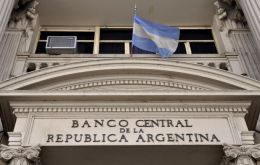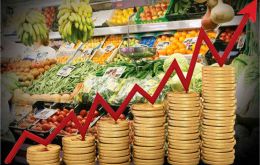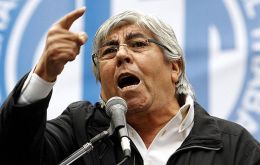MercoPress. South Atlantic News Agency
Tag: Argentina inflation
-
Wednesday, November 8th 2017 - 12:23 UTC
Argentina central bank raises basic rate to 28,75% to contain inflation expectations

Argentina's central bank raised its policy rate to 28.75% on Tuesday, up from 27.25% previously, as inflation expectations rise, the monetary authority said in a statement. It was the bank's second consecutive hike after a long period of holding the rate steady.
-
Tuesday, October 18th 2016 - 10:31 UTC
Argentina lowers interest rates for businesses as inflation tends to subside

Argentina's main state-run bank said it lowered its headline interest rates for loans to businesses on Monday amid expectations that inflation will begin to slow in Latin America's third-largest economy, a move that will help put credit back within firms' reach. Banco Nacion, the country's largest financial institution and which also acts as a development bank, set its annual nominal reference rate for business loans at 27%, down from 32%.
-
Monday, August 29th 2016 - 03:59 UTC
Court ruling and economy contraction push Argentine inflation down in August

Inflation in Argentina during the current month of August could drop to 0.7% because of the Supreme Court’s decision to strike down the hikes in natural gas prices for residential users, according to the official stats office Indec. Similar stats also indicate a strong contraction of the Argentine economy.
-
Saturday, August 13th 2016 - 08:24 UTC
Argentina's July inflation falls to 2%, confirming sliding tendency

Argentina's inflation rate eased to 2% in July, less than half of what it was two months before when the government began reporting consumer price data after revamping the country's troubled statistics office. The July figure was released on Friday by the new Indec data agency. A month earlier it reported 3.1% inflation for June and 4.2% for May when it issued its first consumer price report since President Mauricio Macri took office in December.
-
Thursday, June 16th 2016 - 08:08 UTC
Argentina's revamped stats data launched: May inflation 4.2%

Argentina released inflation figures for the first time since December last year, when newly elected president Mauricio Macri suspended the publication of economic data and intervened the official stats office, Indec, following long standing claims of manipulation by his predecessor.
-
Wednesday, May 25th 2016 - 08:46 UTC
Argentina's April inflation 6.7%, according to the Congress Index

Argentina's April inflation climbed to a record 6.7%, and 19.4% in the first four months of the year, according to the latest Congress Index, announced on Tuesday. Public utility rates were blamed for two thirds of the April increase, the highest for a month since 2002.
-
Monday, May 9th 2016 - 09:17 UTC
S&P raises Argentina's credit rating, but warns about the 40% inflation

Argentina’s credit rating was raised to B- from selective default by S&P Global Ratings, which cited the country’s payment last Thursday of $2.7 billion of past-due interest on bonds in default since July 2014.
-
Wednesday, May 4th 2016 - 08:40 UTC
Argentine unions claim April inflation reached 5% and 40.85% in 12 months

Inflation in Argentina during April reached 5.02% and 40,85% in the last twelve months according to the unions umbrella organization CGT Economic and Social observatory, which was released on Tuesday.
-
Monday, May 2nd 2016 - 08:13 UTC
Argentines worried about inflation and unemployment; fuels increase 10% in May

A clear majority of Argentines are most worried about inflation and unemployment, a report by the D’Alessio IROL and Berenzstein private consulting agencies have showed.
-
Saturday, April 30th 2016 - 12:12 UTC
Argentine unions take to the streets to protest job cuts and inflation

Argentina’s strongest unions brought thousands of people into the streets Friday to protest high inflation and job cuts in the biggest demonstrations against President Mauricio Macri since he took office in December. Demonstrators waving blue and white Argentine flags flooded the main avenues of Buenos Aires, blocking traffic in a protest that brought together rival unions that put aside differences to protest Macri’s policies.
